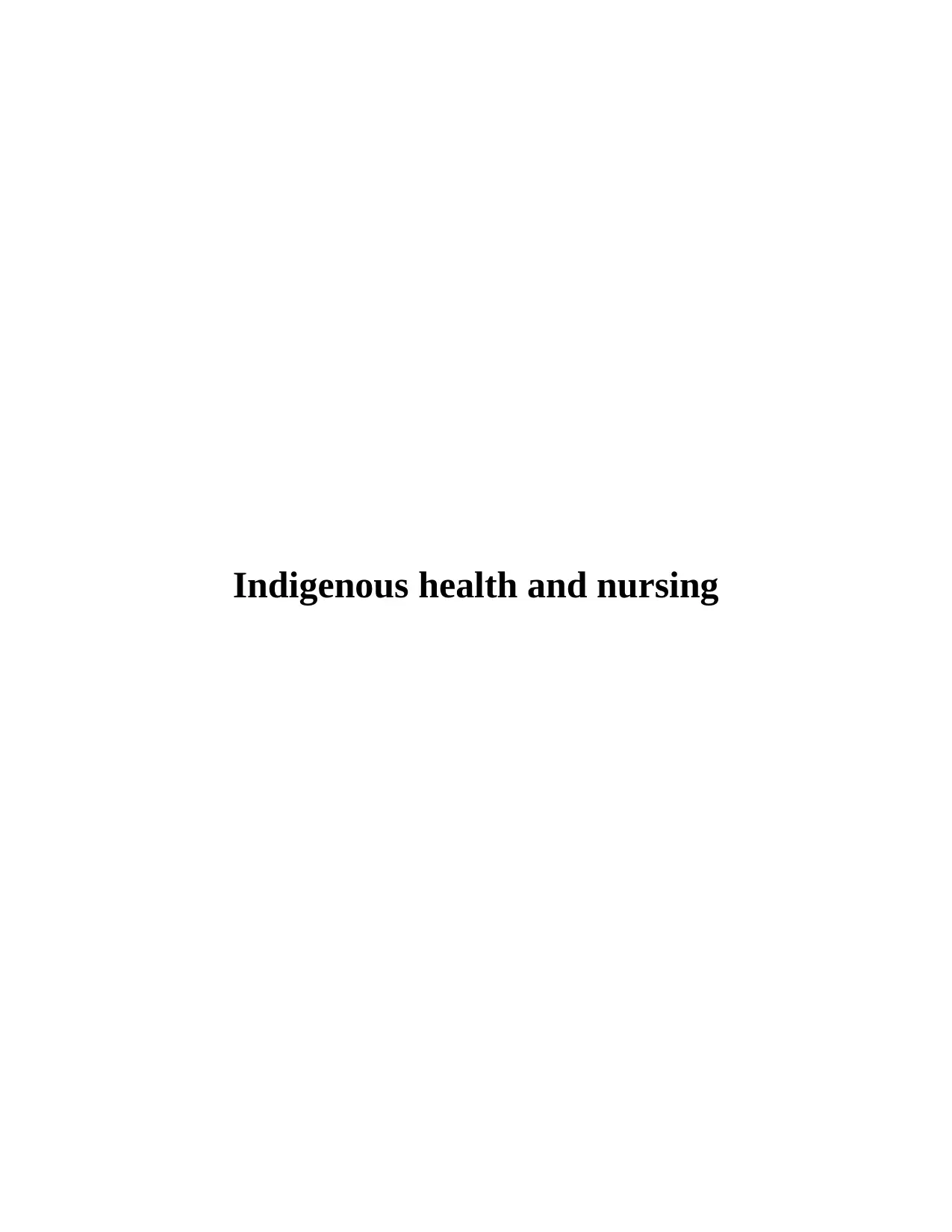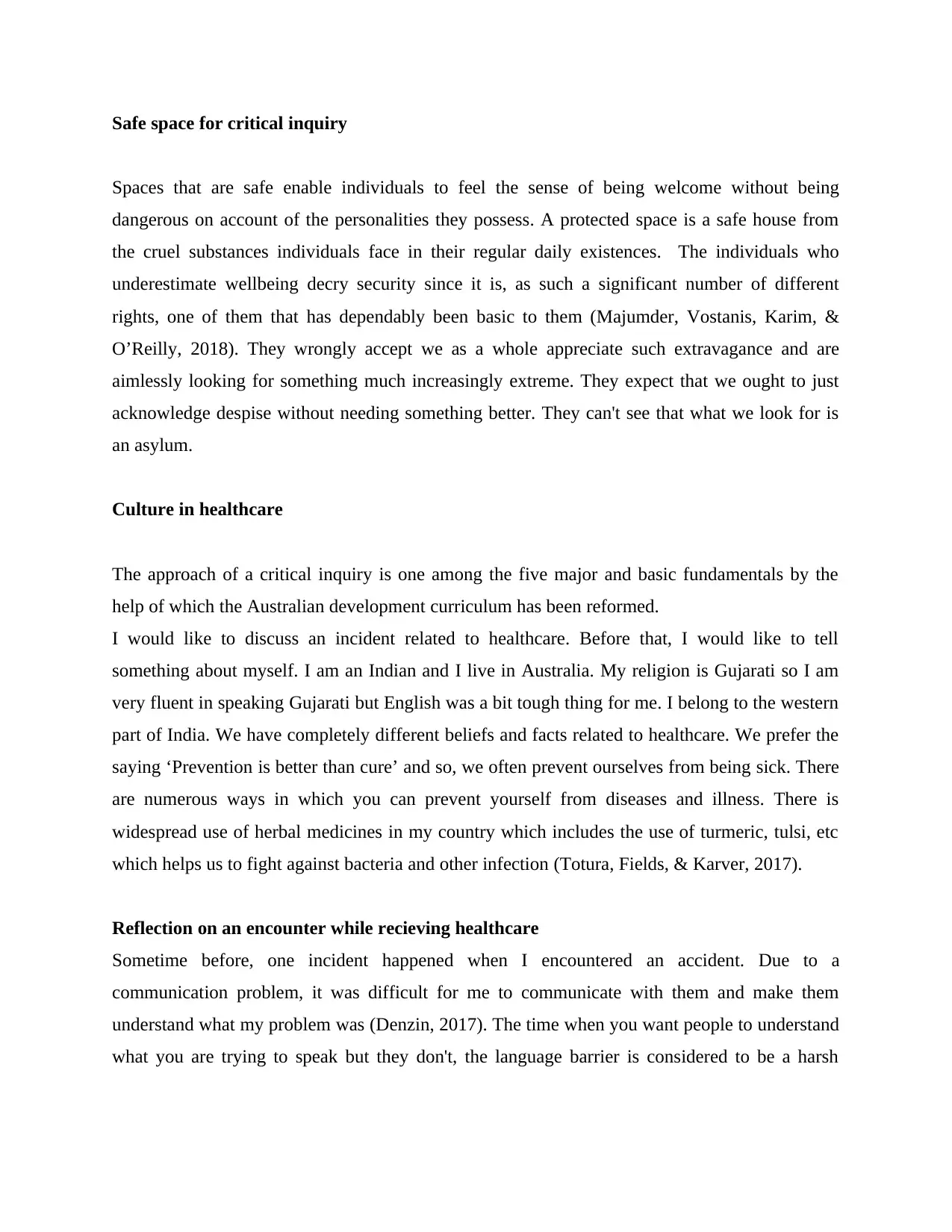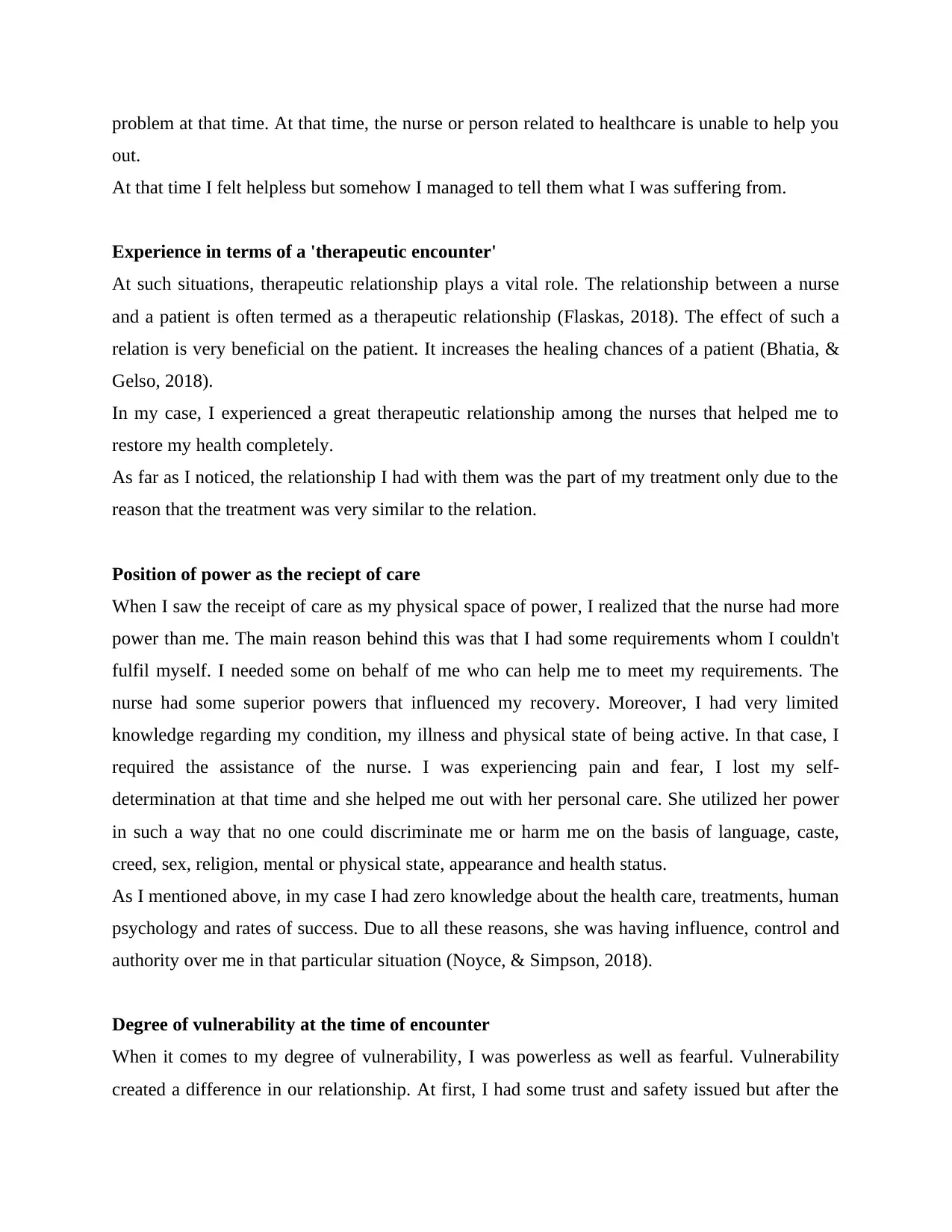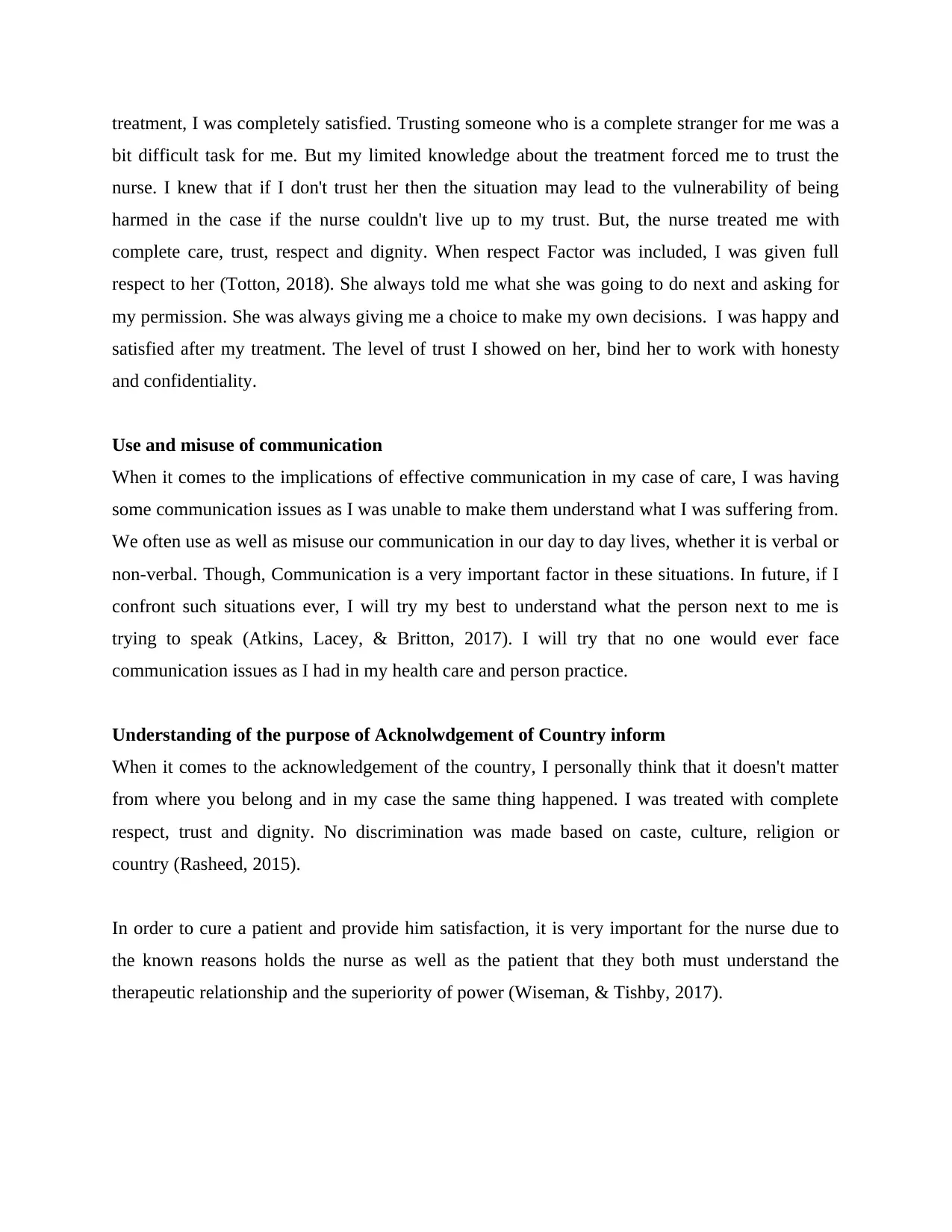Safe Space for Critical Inquiry: Indigenous Health and Nursing
VerifiedAdded on 2023/04/06
|5
|1307
|374
AI Summary
This article discusses the concept of safe spaces in healthcare and its impact on Indigenous health and nursing. It explores the importance of a therapeutic relationship between nurses and patients and reflects on personal experiences. The article also delves into the position of power and vulnerability in healthcare encounters and discusses the use and misuse of communication in healthcare settings.
Contribute Materials
Your contribution can guide someone’s learning journey. Share your
documents today.

Indigenous health and nursing
Secure Best Marks with AI Grader
Need help grading? Try our AI Grader for instant feedback on your assignments.

Safe space for critical inquiry
Spaces that are safe enable individuals to feel the sense of being welcome without being
dangerous on account of the personalities they possess. A protected space is a safe house from
the cruel substances individuals face in their regular daily existences. The individuals who
underestimate wellbeing decry security since it is, as such a significant number of different
rights, one of them that has dependably been basic to them (Majumder, Vostanis, Karim, &
O’Reilly, 2018). They wrongly accept we as a whole appreciate such extravagance and are
aimlessly looking for something much increasingly extreme. They expect that we ought to just
acknowledge despise without needing something better. They can't see that what we look for is
an asylum.
Culture in healthcare
The approach of a critical inquiry is one among the five major and basic fundamentals by the
help of which the Australian development curriculum has been reformed.
I would like to discuss an incident related to healthcare. Before that, I would like to tell
something about myself. I am an Indian and I live in Australia. My religion is Gujarati so I am
very fluent in speaking Gujarati but English was a bit tough thing for me. I belong to the western
part of India. We have completely different beliefs and facts related to healthcare. We prefer the
saying ‘Prevention is better than cure’ and so, we often prevent ourselves from being sick. There
are numerous ways in which you can prevent yourself from diseases and illness. There is
widespread use of herbal medicines in my country which includes the use of turmeric, tulsi, etc
which helps us to fight against bacteria and other infection (Totura, Fields, & Karver, 2017).
Reflection on an encounter while recieving healthcare
Sometime before, one incident happened when I encountered an accident. Due to a
communication problem, it was difficult for me to communicate with them and make them
understand what my problem was (Denzin, 2017). The time when you want people to understand
what you are trying to speak but they don't, the language barrier is considered to be a harsh
Spaces that are safe enable individuals to feel the sense of being welcome without being
dangerous on account of the personalities they possess. A protected space is a safe house from
the cruel substances individuals face in their regular daily existences. The individuals who
underestimate wellbeing decry security since it is, as such a significant number of different
rights, one of them that has dependably been basic to them (Majumder, Vostanis, Karim, &
O’Reilly, 2018). They wrongly accept we as a whole appreciate such extravagance and are
aimlessly looking for something much increasingly extreme. They expect that we ought to just
acknowledge despise without needing something better. They can't see that what we look for is
an asylum.
Culture in healthcare
The approach of a critical inquiry is one among the five major and basic fundamentals by the
help of which the Australian development curriculum has been reformed.
I would like to discuss an incident related to healthcare. Before that, I would like to tell
something about myself. I am an Indian and I live in Australia. My religion is Gujarati so I am
very fluent in speaking Gujarati but English was a bit tough thing for me. I belong to the western
part of India. We have completely different beliefs and facts related to healthcare. We prefer the
saying ‘Prevention is better than cure’ and so, we often prevent ourselves from being sick. There
are numerous ways in which you can prevent yourself from diseases and illness. There is
widespread use of herbal medicines in my country which includes the use of turmeric, tulsi, etc
which helps us to fight against bacteria and other infection (Totura, Fields, & Karver, 2017).
Reflection on an encounter while recieving healthcare
Sometime before, one incident happened when I encountered an accident. Due to a
communication problem, it was difficult for me to communicate with them and make them
understand what my problem was (Denzin, 2017). The time when you want people to understand
what you are trying to speak but they don't, the language barrier is considered to be a harsh

problem at that time. At that time, the nurse or person related to healthcare is unable to help you
out.
At that time I felt helpless but somehow I managed to tell them what I was suffering from.
Experience in terms of a 'therapeutic encounter'
At such situations, therapeutic relationship plays a vital role. The relationship between a nurse
and a patient is often termed as a therapeutic relationship (Flaskas, 2018). The effect of such a
relation is very beneficial on the patient. It increases the healing chances of a patient (Bhatia, &
Gelso, 2018).
In my case, I experienced a great therapeutic relationship among the nurses that helped me to
restore my health completely.
As far as I noticed, the relationship I had with them was the part of my treatment only due to the
reason that the treatment was very similar to the relation.
Position of power as the reciept of care
When I saw the receipt of care as my physical space of power, I realized that the nurse had more
power than me. The main reason behind this was that I had some requirements whom I couldn't
fulfil myself. I needed some on behalf of me who can help me to meet my requirements. The
nurse had some superior powers that influenced my recovery. Moreover, I had very limited
knowledge regarding my condition, my illness and physical state of being active. In that case, I
required the assistance of the nurse. I was experiencing pain and fear, I lost my self-
determination at that time and she helped me out with her personal care. She utilized her power
in such a way that no one could discriminate me or harm me on the basis of language, caste,
creed, sex, religion, mental or physical state, appearance and health status.
As I mentioned above, in my case I had zero knowledge about the health care, treatments, human
psychology and rates of success. Due to all these reasons, she was having influence, control and
authority over me in that particular situation (Noyce, & Simpson, 2018).
Degree of vulnerability at the time of encounter
When it comes to my degree of vulnerability, I was powerless as well as fearful. Vulnerability
created a difference in our relationship. At first, I had some trust and safety issued but after the
out.
At that time I felt helpless but somehow I managed to tell them what I was suffering from.
Experience in terms of a 'therapeutic encounter'
At such situations, therapeutic relationship plays a vital role. The relationship between a nurse
and a patient is often termed as a therapeutic relationship (Flaskas, 2018). The effect of such a
relation is very beneficial on the patient. It increases the healing chances of a patient (Bhatia, &
Gelso, 2018).
In my case, I experienced a great therapeutic relationship among the nurses that helped me to
restore my health completely.
As far as I noticed, the relationship I had with them was the part of my treatment only due to the
reason that the treatment was very similar to the relation.
Position of power as the reciept of care
When I saw the receipt of care as my physical space of power, I realized that the nurse had more
power than me. The main reason behind this was that I had some requirements whom I couldn't
fulfil myself. I needed some on behalf of me who can help me to meet my requirements. The
nurse had some superior powers that influenced my recovery. Moreover, I had very limited
knowledge regarding my condition, my illness and physical state of being active. In that case, I
required the assistance of the nurse. I was experiencing pain and fear, I lost my self-
determination at that time and she helped me out with her personal care. She utilized her power
in such a way that no one could discriminate me or harm me on the basis of language, caste,
creed, sex, religion, mental or physical state, appearance and health status.
As I mentioned above, in my case I had zero knowledge about the health care, treatments, human
psychology and rates of success. Due to all these reasons, she was having influence, control and
authority over me in that particular situation (Noyce, & Simpson, 2018).
Degree of vulnerability at the time of encounter
When it comes to my degree of vulnerability, I was powerless as well as fearful. Vulnerability
created a difference in our relationship. At first, I had some trust and safety issued but after the

treatment, I was completely satisfied. Trusting someone who is a complete stranger for me was a
bit difficult task for me. But my limited knowledge about the treatment forced me to trust the
nurse. I knew that if I don't trust her then the situation may lead to the vulnerability of being
harmed in the case if the nurse couldn't live up to my trust. But, the nurse treated me with
complete care, trust, respect and dignity. When respect Factor was included, I was given full
respect to her (Totton, 2018). She always told me what she was going to do next and asking for
my permission. She was always giving me a choice to make my own decisions. I was happy and
satisfied after my treatment. The level of trust I showed on her, bind her to work with honesty
and confidentiality.
Use and misuse of communication
When it comes to the implications of effective communication in my case of care, I was having
some communication issues as I was unable to make them understand what I was suffering from.
We often use as well as misuse our communication in our day to day lives, whether it is verbal or
non-verbal. Though, Communication is a very important factor in these situations. In future, if I
confront such situations ever, I will try my best to understand what the person next to me is
trying to speak (Atkins, Lacey, & Britton, 2017). I will try that no one would ever face
communication issues as I had in my health care and person practice.
Understanding of the purpose of Acknolwdgement of Country inform
When it comes to the acknowledgement of the country, I personally think that it doesn't matter
from where you belong and in my case the same thing happened. I was treated with complete
respect, trust and dignity. No discrimination was made based on caste, culture, religion or
country (Rasheed, 2015).
In order to cure a patient and provide him satisfaction, it is very important for the nurse due to
the known reasons holds the nurse as well as the patient that they both must understand the
therapeutic relationship and the superiority of power (Wiseman, & Tishby, 2017).
bit difficult task for me. But my limited knowledge about the treatment forced me to trust the
nurse. I knew that if I don't trust her then the situation may lead to the vulnerability of being
harmed in the case if the nurse couldn't live up to my trust. But, the nurse treated me with
complete care, trust, respect and dignity. When respect Factor was included, I was given full
respect to her (Totton, 2018). She always told me what she was going to do next and asking for
my permission. She was always giving me a choice to make my own decisions. I was happy and
satisfied after my treatment. The level of trust I showed on her, bind her to work with honesty
and confidentiality.
Use and misuse of communication
When it comes to the implications of effective communication in my case of care, I was having
some communication issues as I was unable to make them understand what I was suffering from.
We often use as well as misuse our communication in our day to day lives, whether it is verbal or
non-verbal. Though, Communication is a very important factor in these situations. In future, if I
confront such situations ever, I will try my best to understand what the person next to me is
trying to speak (Atkins, Lacey, & Britton, 2017). I will try that no one would ever face
communication issues as I had in my health care and person practice.
Understanding of the purpose of Acknolwdgement of Country inform
When it comes to the acknowledgement of the country, I personally think that it doesn't matter
from where you belong and in my case the same thing happened. I was treated with complete
respect, trust and dignity. No discrimination was made based on caste, culture, religion or
country (Rasheed, 2015).
In order to cure a patient and provide him satisfaction, it is very important for the nurse due to
the known reasons holds the nurse as well as the patient that they both must understand the
therapeutic relationship and the superiority of power (Wiseman, & Tishby, 2017).
Secure Best Marks with AI Grader
Need help grading? Try our AI Grader for instant feedback on your assignments.

References
Atkins, K. Lacey, S. & Britton (2017). Ethics & Law for Australian Nurses (2nd ed.).
Cambridge: Cambridge University Press
Bhatia, A., & Gelso, C. J. (2018). Therapists’ perspective on the therapeutic relationship:
Examining a tripartite model. Counselling Psychology Quarterly, 31(3), 271-293.
Denzin, N. K. (2017). Critical qualitative inquiry. Qualitative Inquiry, 23(1), 8-16.
Flaskas, C. (2018). The therapeutic relationship in systemic therapy.United Kingdom:
Routledge.
Majumder, P., Vostanis, P., Karim, K., & O’Reilly, M. (2018). Potential barriers in the
therapeutic relationship in unaccompanied refugee minors in mental health. Journal of
Mental Health, 16(1), 1-8.
Noyce, R., & Simpson, J. (2018). The Experience of Forming a Therapeutic Relationship from
the Client’s Perspective: A Metasynthesis. Psychotherapy Research, 28(2), 281-296.
Rasheed, S. P. (2015). Self-Awareness as a Therapeutic Tool for Nurse/Client Relationship.
International journal of caring sciences, 8(1), 106-200.
Totton, N. (2018). Power in the therapeutic relationship. In The Political Self. United Kingdom:
Routledge.
Totura, C. M. W., Fields, S. A., & Karver, M. S. (2017). The Role of the Therapeutic
Relationship in Psychopharmacological Treatment Outcomes: A Meta-analytic Review.
Psychiatric Services, 69(1), 41-47.
Wiseman, H., & Tishby, O. (Eds.). (2017). The therapeutic relationship: Innovative
investigations. United Kingdom: Routledge.
Atkins, K. Lacey, S. & Britton (2017). Ethics & Law for Australian Nurses (2nd ed.).
Cambridge: Cambridge University Press
Bhatia, A., & Gelso, C. J. (2018). Therapists’ perspective on the therapeutic relationship:
Examining a tripartite model. Counselling Psychology Quarterly, 31(3), 271-293.
Denzin, N. K. (2017). Critical qualitative inquiry. Qualitative Inquiry, 23(1), 8-16.
Flaskas, C. (2018). The therapeutic relationship in systemic therapy.United Kingdom:
Routledge.
Majumder, P., Vostanis, P., Karim, K., & O’Reilly, M. (2018). Potential barriers in the
therapeutic relationship in unaccompanied refugee minors in mental health. Journal of
Mental Health, 16(1), 1-8.
Noyce, R., & Simpson, J. (2018). The Experience of Forming a Therapeutic Relationship from
the Client’s Perspective: A Metasynthesis. Psychotherapy Research, 28(2), 281-296.
Rasheed, S. P. (2015). Self-Awareness as a Therapeutic Tool for Nurse/Client Relationship.
International journal of caring sciences, 8(1), 106-200.
Totton, N. (2018). Power in the therapeutic relationship. In The Political Self. United Kingdom:
Routledge.
Totura, C. M. W., Fields, S. A., & Karver, M. S. (2017). The Role of the Therapeutic
Relationship in Psychopharmacological Treatment Outcomes: A Meta-analytic Review.
Psychiatric Services, 69(1), 41-47.
Wiseman, H., & Tishby, O. (Eds.). (2017). The therapeutic relationship: Innovative
investigations. United Kingdom: Routledge.
1 out of 5
Related Documents
Your All-in-One AI-Powered Toolkit for Academic Success.
+13062052269
info@desklib.com
Available 24*7 on WhatsApp / Email
![[object Object]](/_next/static/media/star-bottom.7253800d.svg)
Unlock your academic potential
© 2024 | Zucol Services PVT LTD | All rights reserved.





